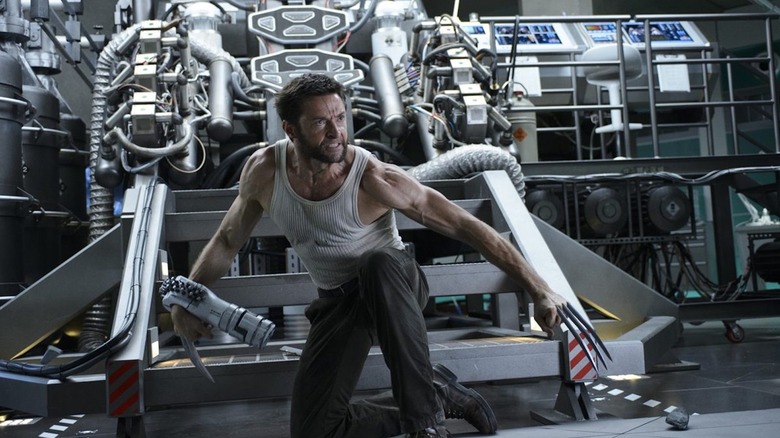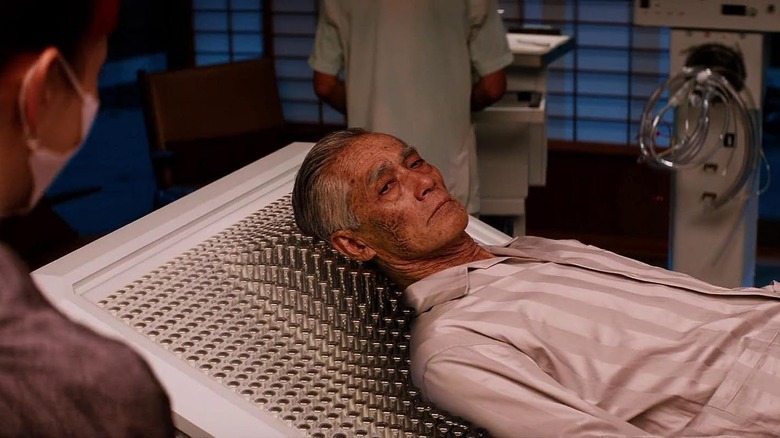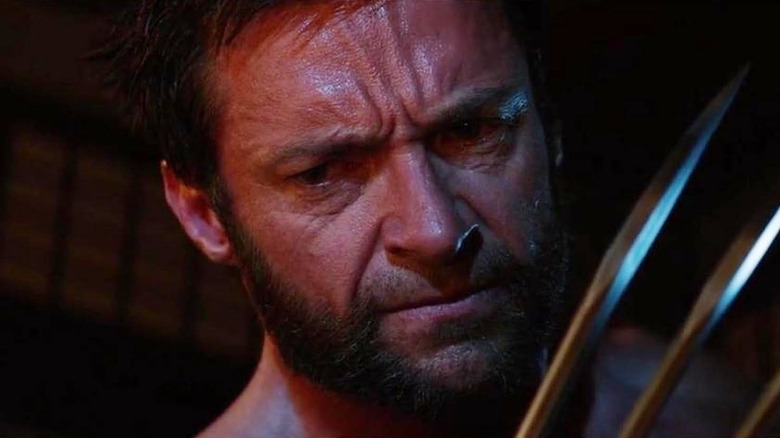How Fox Stopped The Wolverine From Being The First R-Rated X-Men Film
How did we get from the hot mess that is director Gavin Hood's "X-Men Origins: Wolverine" to the soulful elegy that is director James Mangold's "Logan?" The answer is Mangold's second entry in the "Wolverine" trilogy, "The Wolverine." Loosely based on Chris Claremont and Frank Miller's limited 1982 comic book arc about Wolvie's adventures in Japan, "The Wolverine" lies precisely at the nexus between Hood's "Wolverine" flick and "Logan." It's more meditative than the former yet less sophisticated and bloody than the latter. It also has some of the CGI beat-em-up silliness that dilutes Hood's film but is absent from Mangold's final chapter in the saga.
Mangold and his leading man, Hugh Jackman, had hoped to make "The Wolverine" the first R-rated "X-Men" film. "I knew that if Hugh and I could get an R, then we'll have the freedom to make an adult film," Mangold told Den of Geek in 2017. "Because the second the marketing arm of a studio realizes it cannot market to children, five or six creative things happen. The scenes can go deeper and can be written for adults. Not just language, not just [violence] [...] but the themes can be more interesting, the words you're using can be more complicated. The ideas can be more complicated."
So why was "The Wolverine" released with a PG-13 instead? To hear Mangold tell it, it was all a matter of being in the wrong place at the wrong time in the history of superhero films.
When PG-13 isn't the way to go
Watching "The Wolverine," you get a sense of the film Mangold wanted to make. Its story is all about death and mortality. Logan (Jackman) spends the majority of the film tortured by the memory of the late Jean Grey (Famke Janssen). When he returns to Japan, it's at the behest of Ichirō Yashida (Haruhiko Yamanouchi), a now-elderly man he saved during the atomic bombing of Nagasaki back when Logan was imprisoned at a Japanese POW camp during WWII. Upon revisiting the country, Logan is flooded with memories of the pain and suffering he witnessed there. Even with some extraneous "X-Men" characters thrown into the mix, the first two-thirds of the film unfolds as a neo-noir drama set in a world of mutants. Only during the third act does "The Wolverine" become more of a typical superhero film, complete with a giant CGI opponent for Logan to punch.
When interviewed by Den of Geek, Mangold didn't deny the third act tonal shift was 20th Century Fox's doing. "I think I wasn't quite as sharp-elbowed in a couple of cases as I should've been, so yes is the answer," he said. The problem was that PG-13, CGI-heavy superhero films were all the rage when "The Wolverine" came out in 2013 (recall that "The Avengers" had opened just one year prior), so that's exactly what Fox wanted him to make. The irony, of course, is that it was the leftover elements from Mangold's original vision that allowed the film to better stand out from the rest of the crowd. "The thing the studio was most worried about — which was this kind of Hong Kong crime movie, this kind of Japanese noir I was making, was almost our best asset," he noted.
'I think times have changed now'
Mangold would eventually release an extended cut titled "The Wolverine Unleashed Extended Edition," but even that wasn't a true reflection of what he'd hoped to do. Because he had crafted the film knowing he'd most likely have to edit it down to a PG-13, most of the extra material in the extended cut only serves to make "The Wolverine" more adult on a superficial level (read: it adds more blood and cursing). It wasn't until he and co-writer Scott Frank ("Minority Report") got the go-ahead to treat "Logan" as an R-rated project that Mangold really got to make the grittier and more mature Wolverine film he'd had in mind.
For as much as "Logan" undoubtedly benefitted from the success of the R-rated "Deadpool" a year before its release, Mangold told Den of Geek he suspected a change in studio regime was a big help as well:
"I do think there was a bit of a regime change at Fox, between the two movies. The people running Fox now have a clearer understanding that their audiences have changed. I don't think when I made 'The Wolverine' [I had] gone as far as I have on this film. I think times have changed now."
10 years out from the original release of "The Wolverine," that's only become doubly true. 2023 alone has seen multiple superhero films misfire financially, resulting in some of the costliest box office flops of all time. Even "Guardians of the Galaxy" and "The Suicide Squad" director turned DC Studios co-head James Gunn thinks superhero films have become way too unadventurous over the last decade. It's high-past time for studios to truly shake things up once more, lest the genre fade out of style completely.


